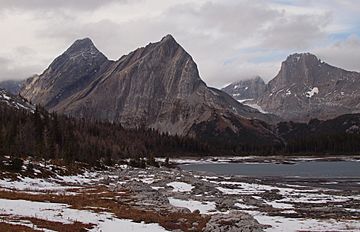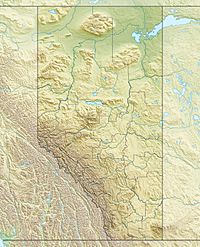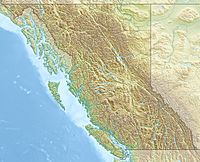Mount Maude (Canada) facts for kids
Quick facts for kids Mount Maude |
|
|---|---|

Mount Maude (left) seen from Turbine Canyon
|
|
| Highest point | |
| Elevation | 3,043 m (9,984 ft) |
| Prominence | 330 m (1,080 ft) |
| Listing | Mountains of Alberta Mountains of British Columbia |
| Geography | |
| Country | Canada |
| Provinces | Alberta and British Columbia |
| Topo map | NTS 82J/11 |
| Climbing | |
| First ascent | 1922 E.W. Crawford, G.R. Adams, M.D. Geddes, W. Gillespie, N.D.B. Hendrie, M.K.P, Hendrie, J.B. Wilcox, Rudolph Aemmer |
Mount Maude is a mountain located on the border of Alberta and British Columbia in Canada. It sits right on the Continental Divide, which is like a giant natural line that separates rivers flowing to the Pacific Ocean from those flowing to the Atlantic or Arctic oceans.
The mountain was named in 1918 after Sir Frederick Stanley Maude. He was a British army leader, called a Lieutenant General, who was famous for capturing Baghdad during World War I. Mount Maude was first climbed in 1922 by a group including G.R. Adams.
Discover Mount Maude
Mount Maude stands tall at 3,043 meters (about 9,984 feet) above sea level. The area around the mountain is wild and natural. It has not been farmed or developed, so most of its original plants and trees are still there.
Exploring the Mountain
You can climb Mount Maude by hiking and finding your own way up. However, parts of the mountain can be very icy, so it's a challenging climb. There are no people living directly on Mount Maude. The closest town, Kananaskis Village, is quite far away.
Weather and Earthquakes
Mount Maude experiences clear changes between its cold and warm seasons. July is usually the warmest month, with an average temperature of about 13.9 °C (57 °F). The skies are often sunny then.
In contrast, January is the coldest month. The average temperature at night can drop to about −20 °C (−4 °F). Winters here have long periods of freezing temperatures. The sun rises around 7:55 am and sets around 4:55 pm during winter.
Small earthquakes happen on Mount Maude about once every 50 years. These quakes usually rank around 5 or 6 on the Richter scale. This means people in the area would feel the ground shake, but any damage would likely be minor.
 | Toni Morrison |
 | Barack Obama |
 | Martin Luther King Jr. |
 | Ralph Bunche |



